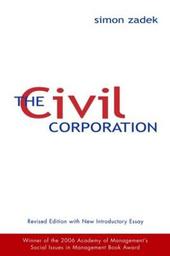
|
The Civil Corporation: the New Economy of Corporate Citizenship
Paperback
Main Details
| Title |
The Civil Corporation: the New Economy of Corporate Citizenship
|
| Authors and Contributors |
By (author) Simon Zadek
|
| Physical Properties |
| Format:Paperback | | Pages:302 | | Dimensions(mm): Height 234,Width 156 |
|
| Category/Genre | Business ethics
Management and management techniques |
|---|
| ISBN/Barcode |
9781844074310
|
| Classifications | Dewey:658.408 |
|---|
| Audience | | Professional & Vocational | |
|---|
| Edition |
Revised edition
|
| Illustrations |
Figures, boxes, index
|
|
Publishing Details |
| Publisher |
Taylor & Francis Ltd
|
| Imprint |
Earthscan Ltd
|
| Publication Date |
4 April 2007 |
| Publication Country |
United Kingdom
|
Description
The Civil Corporation is top draw reading for business professionals, management students and academics, activists and public servants. It goes to the heart of the issue of business in society, cutting through the rhetoric of campaigners and business-speak by framing the tough questions in balanced and yet provocative terms. Crucially, it connects an insightful vista of the broader landscape with a set of practical 'do's' that have stood the test of time. The book was awarded the prestigious Academy of Management's Social Issues in Management Book Award in 2006, confirming that Zadek has produced what every author aspires to: a classic book that is timely in its application.
Author Biography
Dr Simon Zadek is Chief Executive of AccountAbility, a Senior Fellow at the Centre for Government and Business of Harvard University's Kennedy School, and an Honorary Professor at the University of South Africa's Centre for Corporate Citizenship. He sits on the International Advisory Board of Instituto Ethos, the Advisory Board of Generation Investment Management, and the boards of the Employers' Forum on Disability and GAN-NET. In 2003 he was named one of the World Economic Forum's 'Global Leaders for Tomorrow'. Simon's previous roles include Visiting Professor at the Copenhagen Business School, the Development Director of the New Economics Foundation, and founding Chair of the Ethical Trading Initiative. He has served on numerous boards and advisory councils, including the State of the World's Commission on Globalization, the International Labour Organization's World Commission on the Social Dimensions of Globalization, the UN Commission for Social Development Expert Group on CSR, and the founding Steering Committee of the Global Reporting Initiative. Simon has supported many businesses' efforts around the world in driving accountability innovations into their strategies and practices. His work has increasingly focused on facilitating businesses and their stakeholders in developing mutual understanding and collaborative initiatives. His work in this regard has been both at company level (for example, for Gap Inc in their work around labour standards, and GE in its development of its approach to human rights) through to his convening role of the MFA Forum, a large-scale collaboration involving leading textiles and apparel companies, civil society and labour organizations, international development agencies and financing institutions, and national governments and business associations. He has authored, co-authored and co-edited numerous publications, including, most recently, two Harvard Working Papers on the role of multi-stakeholder partnerships in development and governance, Governing Partnership Governance (2006) and The Logic of Collaborative Governance (2005). He has written extensively on the impact of corporate responsibility on the competitiveness of nations Responsible Competitiveness (2005). His PhD thesis was published as The Economics of Utopia (1994), and an anthology of his writings was published under the title Tomorrow's History (2004). The Civil Corporation: the New Economy of Corporate Citizenship has become a classic in the field since it was first published in 2001, and has been recognized by the Academy of Management by being honoured with the Social Issues in Management Book Award for 2006. He is currently completing his next book, The New Competitiveness, which will be published during 2007 (Harvard Business School Press).
Reviews'Every field needs its gurus and, in Simon Zadek, corporate accountability has a leading contender for the title.' Corporate Citizenship Briefing 'Just as corporate responsibility is a 'must-do' rather than 'nice-to-do' for our society, The Civil Corporation is a 'must-read' rather than 'nice-to-read' for practitioners and scholars.' Zhiye He, Professor at Guanghua School of Management of Peking University, Editor in Chief of the Peking Business Review, Director of the Management Case Center of Peking University 'Simon Zadek is a visionary of an unusually practical sort. His ideas invariably are cutting edge but he is able to relate them to the most immediate concerns of those who run - and run to keep up with - the modern corporation. The Civil Corporation enables us to move beyond isolated experiments towards a more fundamental shift in the accountability and purpose of business and its role in global governance.' John G. Ruggie, Professor of International Affairs, Director of the Center for Business and Government, Harvard University, and UN Special Representative for Business and Human Rights 'The Civil Corporation breaks new and critical ground on the impact of the business and society debate on the dynamics of business strategy. I single it out as a must read for all scholars and practitioners who study and manage businesses that seriously aim at blending societal and economic welfare in their decisions and actions.' Maurizio Zollo, Shell Fellow in Business and the Environment, and Associate Professor of Strategy, INSEAD 'The intricate analysis ... makes a powerful case for businesses to reassess their values, relationships and processes' Financial Times 'One of the leading thinkers in the area of corporations and their relationship with society.' International Labour Review 'Broad-ranging, high-minded, and leading edge.' Future Survey 'Makes a powerful case for businesses to reassess their values, relationships and processes.' Financial Times, 31st October, 2001
|